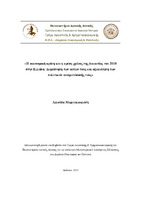| dc.contributor.advisor | Βαβούρα, Χαρίκλεια | |
| dc.contributor.advisor | Vavouras, Ioannis | |
| dc.contributor.author | Μαργιολακιώτη, Λελούδα | |
| dc.date.accessioned | 2023-07-07T08:46:27Z | |
| dc.date.available | 2023-07-07T08:46:27Z | |
| dc.date.issued | 2023-07-03 | |
| dc.identifier.uri | https://polynoe.lib.uniwa.gr/xmlui/handle/11400/4593 | |
| dc.identifier.uri | http://dx.doi.org/10.26265/polynoe-4431 | |
| dc.description.abstract | Σκοπός της παρούσας εργασίας είναι να αναλυθούν τα αίτια που οδήγησαν την Ελλάδα στην οικονομική και δημοσιονομική κρίση της δεκαετίας του 2010. Μελετώντας την εκτεταμένη βιβλιογραφία που υπάρχει για το θέμα αυτό, θα ανατρέξουμε μερικές δεκαετίες πίσω, και θα εξετάσουμε τις οικονομικές πολιτικές που εφαρμόστηκαν, ιδιαίτερα μετά την είσοδο της Ελλάδας στην Ε.Ο.Κ, το 1981, και στις δεκαετίες που ακολούθησαν μέχρι την ένταξη της στην ευρωζώνη, οι οποίες χαρακτηρίστηκαν από στασιμοπληθωρισμό, αποσταθεροποίηση της οικονομίας και άκαρπες προσπάθειες οικονομικής προσαρμογής. Οι ανισορροπίες που δημιουργήθηκαν δεν αντιμετωπίστηκαν επαρκώς, με αποτέλεσμα να επιδεινωθούν λόγω των αδυναμιών των προγραμμάτων προσαρμογής. Εξαιτίας αυτών των διαρθρωτικών και δημοσιονομικών ανισορροπιών, όταν η Ελλάδα εισήλθε στην ευρωζώνη, οδηγήθηκε στην αποσταθεροποίηση του ισοζυγίου τρεχουσών συναλλαγών της και στην αυξανόμενη ανάγκη για εξωτερικό δανεισμό. Η συσσώρευση των δημοσιονομικών ελλειμμάτων οδήγησε στη διόγκωση του δημόσιου χρέους, ώστε μετά το ξέσπασμα της χρηματοπιστωτικής κρίσης το 2008, η Ελλάδα να μην μπορεί να δανειστεί, να κινδυνεύει να χρεοκοπήσει και να προσφύγει στους θεσμούς με την υπογραφή τριών μνημονίων, με όλα τα επακόλουθα για την οικονομική και κοινωνική ζωή των πολιτών, που θα εξεταστούν στην εργασία αυτή. | el |
| dc.format.extent | 144 | el |
| dc.language.iso | el | el |
| dc.publisher | Πανεπιστήμιο Δυτικής Αττικής | el |
| dc.rights | Αναφορά Δημιουργού - Μη Εμπορική Χρήση - Παρόμοια Διανομή 4.0 Διεθνές | * |
| dc.rights | Attribution-NonCommercial-NoDerivatives 4.0 Διεθνές | * |
| dc.rights.uri | http://creativecommons.org/licenses/by-nc-nd/4.0/ | * |
| dc.subject | Χρηματοπιστωτική κρίση | el |
| dc.subject | Οικονομικές κρίσεις | el |
| dc.subject | Δημοσιονομική κρίση | el |
| dc.subject | Κρίση χρέους | el |
| dc.subject | Ισοζύγιο τρεχουσών συναλλαγών | el |
| dc.subject | Δημοσιονομικό έλλειμμα | el |
| dc.subject | Financial crisis | el |
| dc.subject | Debt crisis | el |
| dc.subject | Deficits | el |
| dc.subject | Economic crisis | el |
| dc.title | Η οικονομική κρίση και η κρίση χρέους της δεκαετίας του 2010 στην Ελλάδα: Διερεύνηση των αιτίων τους και αξιολόγηση των πολιτικών αντιμετώπισής τους | el |
| dc.title.alternative | The financial crisis and the debt crisis of the 2010s in Greece: Investigation of their causes and evaluation of the policies to deal with them | el |
| dc.type | Μεταπτυχιακή διπλωματική εργασία | el |
| dc.contributor.committee | HYZ, ALINA | |
| dc.contributor.committee | Αλεξόπουλος, Ανδρέας | |
| dc.contributor.faculty | Σχολή Διοικητικών, Οικονομικών & Κοινωνικών Επιστημών | el |
| dc.contributor.department | Τμήμα Λογιστικής και Χρηματοοικονομικής | el |
| dc.contributor.master | Δημόσια Οικονομική και Πολιτική | el |
| dc.description.abstracttranslated | The purpose of this thesis is to analyze the causes that led Greece to the economic and fiscal crisis of the 2010s. Studying the extensive literature that exists on this subject, we will look back a few decades, and examine the economic policies that were implemented, especially after the entry of Greece into the European Economic Community in 1981, and in the decades that followed until its integration into the eurozone, which were characterized by stagnant inflation, destabilization of the economy and fruitless attempts at economic adjustment. The imbalances that were created were not adequately addressed, resulting in their worsening due to the weaknesses of the adjustment programs. Because of these structural and fiscal imbalances, when Greece entered the Eurozone, it led to a destabilization of its current account balance and an increasing need for external borrowing
The accumulation of fiscal deficits led to the swelling of the public debt, so that after the outbreak of the financial crisis in 2008, Greece could not borrow, risked bankruptcy and resorted to the institutions by signing three memoranda, with all the consequences for the economic and social life of citizens, which will be examined in this work. | el |


